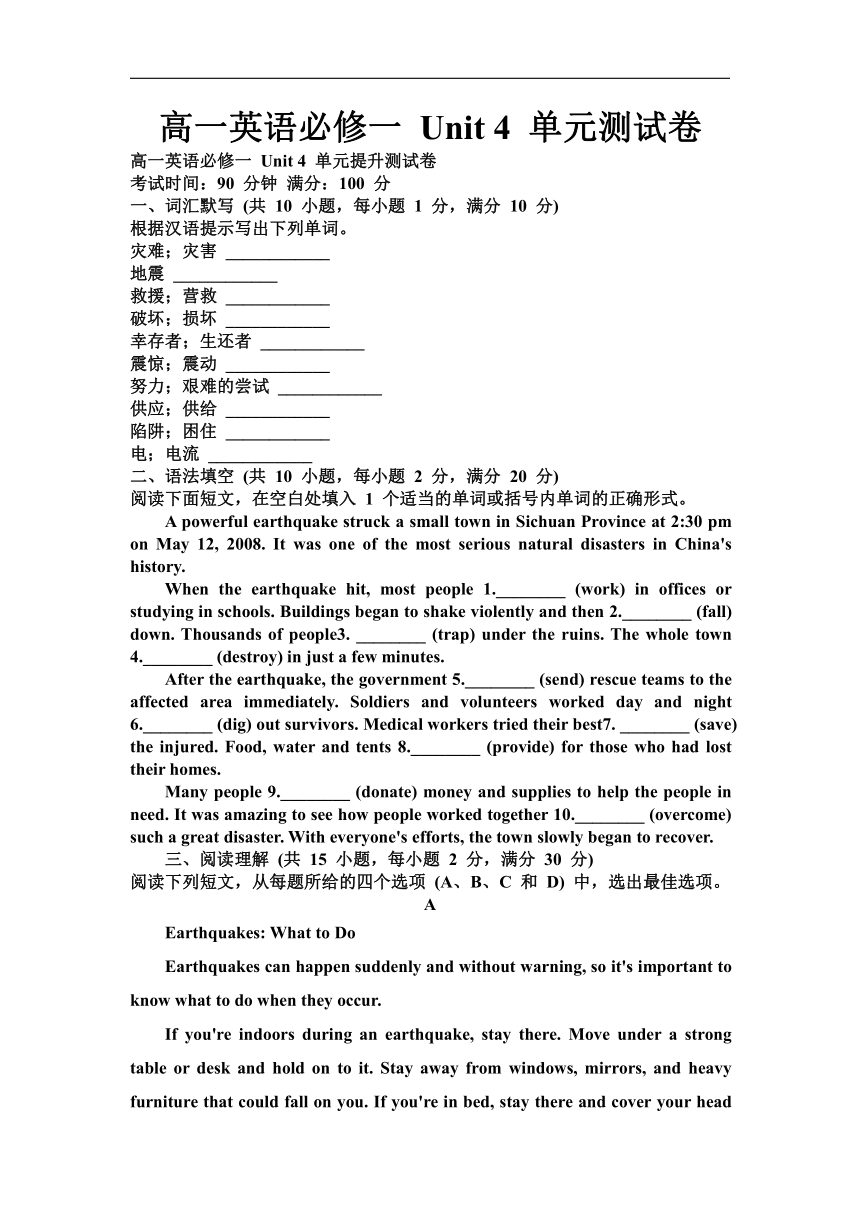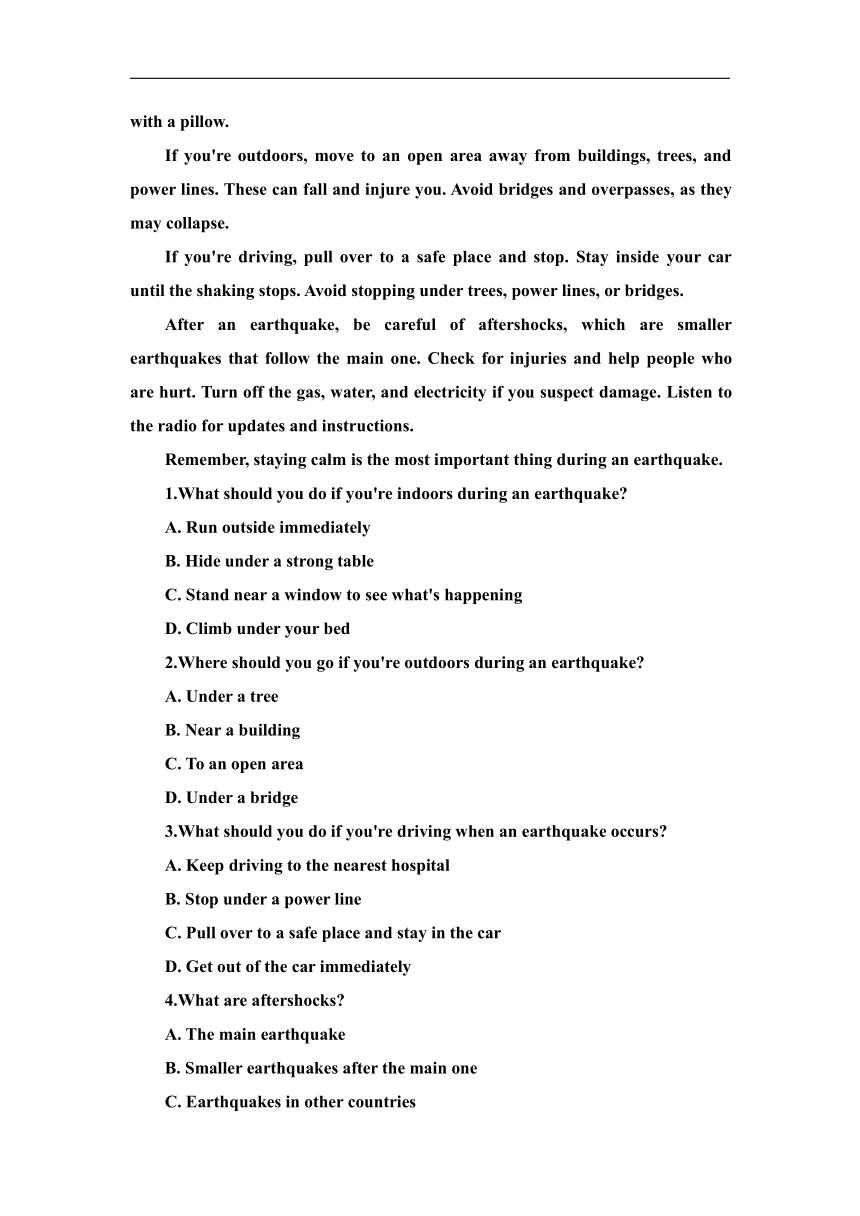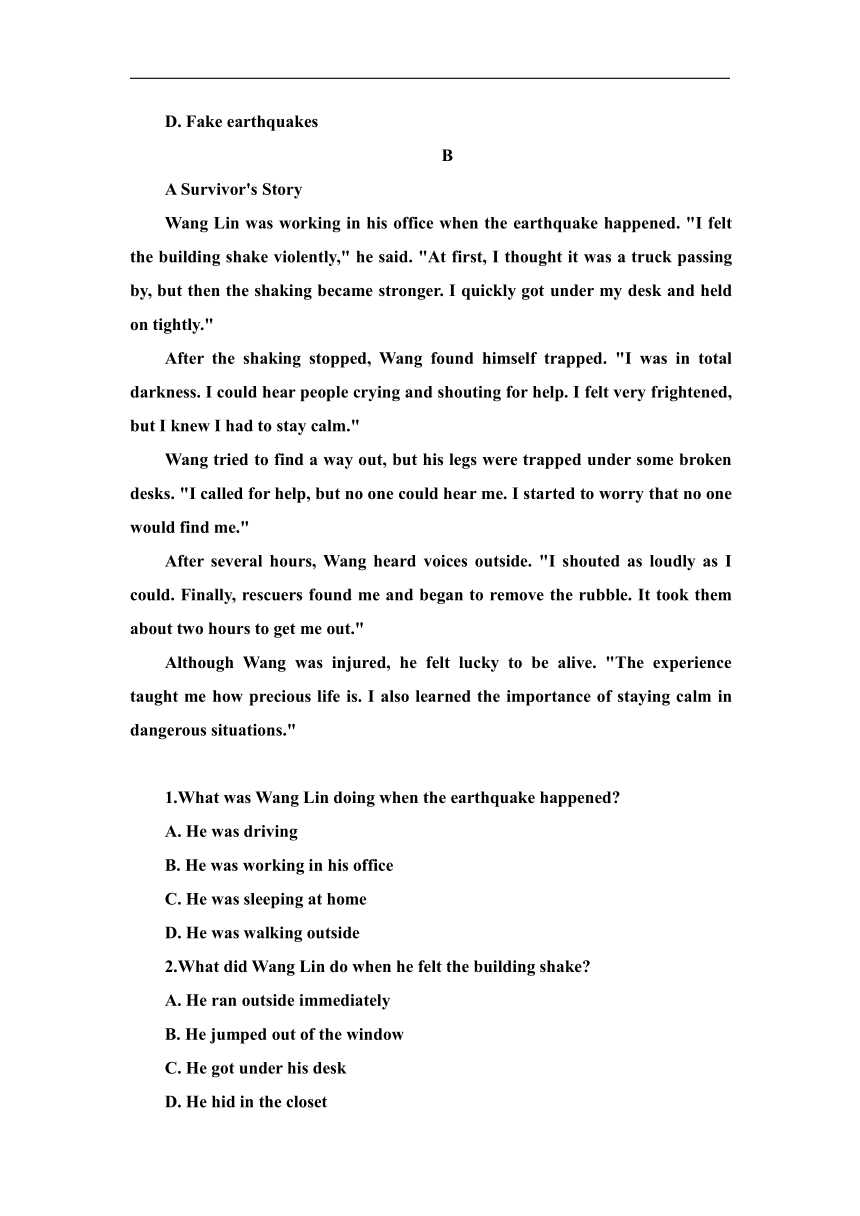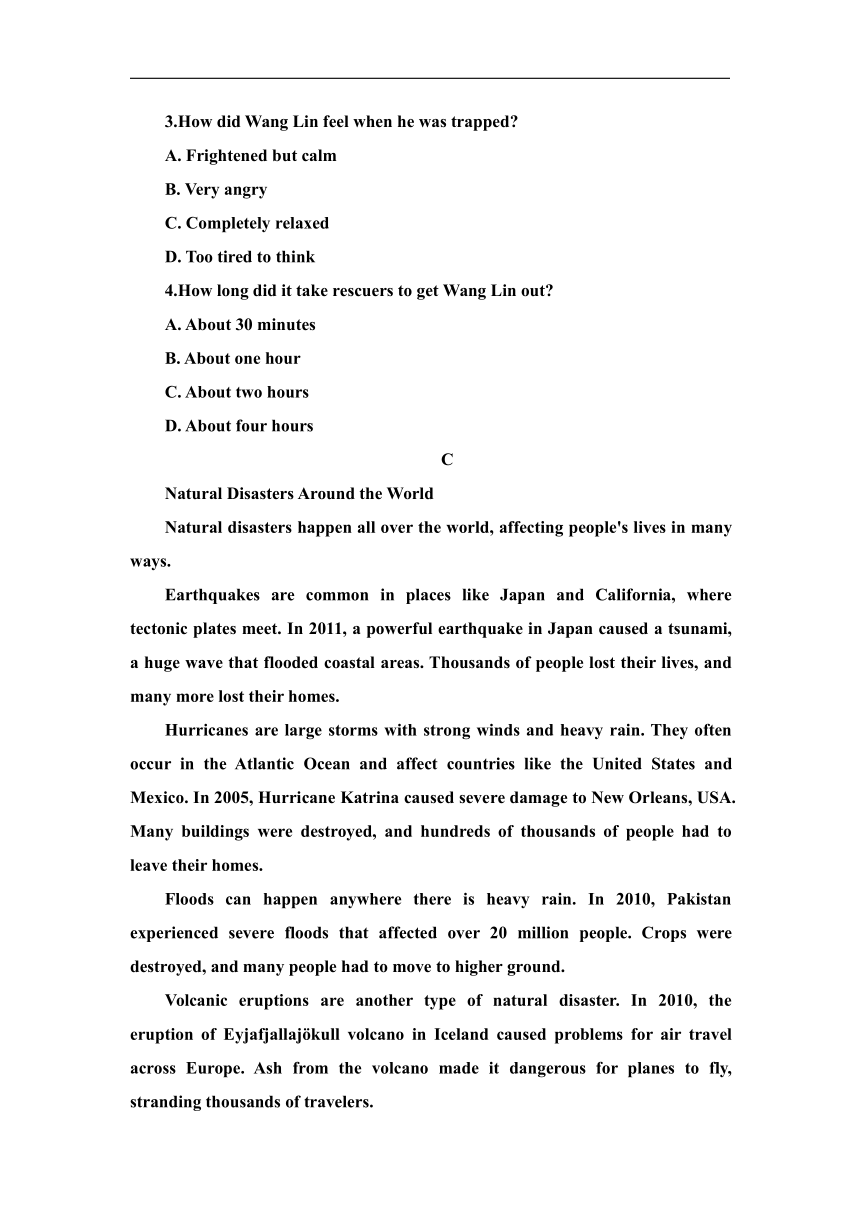Unit4 Natural Disasters单元提升测试卷(含答案)-2025-2026学年高中英语人教版必修第一册
文档属性
| 名称 | Unit4 Natural Disasters单元提升测试卷(含答案)-2025-2026学年高中英语人教版必修第一册 |  | |
| 格式 | docx | ||
| 文件大小 | 24.4KB | ||
| 资源类型 | 教案 | ||
| 版本资源 | 人教版(2019) | ||
| 科目 | 英语 | ||
| 更新时间 | 2025-08-28 22:33:43 | ||
图片预览




文档简介
高一英语必修一 Unit 4 单元测试卷
高一英语必修一 Unit 4 单元提升测试卷
考试时间:90 分钟 满分:100 分
一、词汇默写 (共 10 小题,每小题 1 分,满分 10 分)
根据汉语提示写出下列单词。
灾难;灾害 ____________
地震 ____________
救援;营救 ____________
破坏;损坏 ____________
幸存者;生还者 ____________
震惊;震动 ____________
努力;艰难的尝试 ____________
供应;供给 ____________
陷阱;困住 ____________
电;电流 ____________
二、语法填空 (共 10 小题,每小题 2 分,满分 20 分)
阅读下面短文,在空白处填入 1 个适当的单词或括号内单词的正确形式。
A powerful earthquake struck a small town in Sichuan Province at 2:30 pm on May 12, 2008. It was one of the most serious natural disasters in China's history.
When the earthquake hit, most people 1.________ (work) in offices or studying in schools. Buildings began to shake violently and then 2.________ (fall) down. Thousands of people3. ________ (trap) under the ruins. The whole town 4.________ (destroy) in just a few minutes.
After the earthquake, the government 5.________ (send) rescue teams to the affected area immediately. Soldiers and volunteers worked day and night 6.________ (dig) out survivors. Medical workers tried their best7. ________ (save) the injured. Food, water and tents 8.________ (provide) for those who had lost their homes.
Many people 9.________ (donate) money and supplies to help the people in need. It was amazing to see how people worked together 10.________ (overcome) such a great disaster. With everyone's efforts, the town slowly began to recover.
三、阅读理解 (共 15 小题,每小题 2 分,满分 30 分)
阅读下列短文,从每题所给的四个选项 (A、B、C 和 D) 中,选出最佳选项。
A
Earthquakes: What to Do
Earthquakes can happen suddenly and without warning, so it's important to know what to do when they occur.
If you're indoors during an earthquake, stay there. Move under a strong table or desk and hold on to it. Stay away from windows, mirrors, and heavy furniture that could fall on you. If you're in bed, stay there and cover your head with a pillow.
If you're outdoors, move to an open area away from buildings, trees, and power lines. These can fall and injure you. Avoid bridges and overpasses, as they may collapse.
If you're driving, pull over to a safe place and stop. Stay inside your car until the shaking stops. Avoid stopping under trees, power lines, or bridges.
After an earthquake, be careful of aftershocks, which are smaller earthquakes that follow the main one. Check for injuries and help people who are hurt. Turn off the gas, water, and electricity if you suspect damage. Listen to the radio for updates and instructions.
Remember, staying calm is the most important thing during an earthquake.
1.What should you do if you're indoors during an earthquake
A. Run outside immediately
B. Hide under a strong table
C. Stand near a window to see what's happening
D. Climb under your bed
2.Where should you go if you're outdoors during an earthquake
A. Under a tree
B. Near a building
C. To an open area
D. Under a bridge
3.What should you do if you're driving when an earthquake occurs
A. Keep driving to the nearest hospital
B. Stop under a power line
C. Pull over to a safe place and stay in the car
D. Get out of the car immediately
4.What are aftershocks
A. The main earthquake
B. Smaller earthquakes after the main one
C. Earthquakes in other countries
D. Fake earthquakes
B
A Survivor's Story
Wang Lin was working in his office when the earthquake happened. "I felt the building shake violently," he said. "At first, I thought it was a truck passing by, but then the shaking became stronger. I quickly got under my desk and held on tightly."
After the shaking stopped, Wang found himself trapped. "I was in total darkness. I could hear people crying and shouting for help. I felt very frightened, but I knew I had to stay calm."
Wang tried to find a way out, but his legs were trapped under some broken desks. "I called for help, but no one could hear me. I started to worry that no one would find me."
After several hours, Wang heard voices outside. "I shouted as loudly as I could. Finally, rescuers found me and began to remove the rubble. It took them about two hours to get me out."
Although Wang was injured, he felt lucky to be alive. "The experience taught me how precious life is. I also learned the importance of staying calm in dangerous situations."
1.What was Wang Lin doing when the earthquake happened
A. He was driving
B. He was working in his office
C. He was sleeping at home
D. He was walking outside
2.What did Wang Lin do when he felt the building shake
A. He ran outside immediately
B. He jumped out of the window
C. He got under his desk
D. He hid in the closet
3.How did Wang Lin feel when he was trapped
A. Frightened but calm
B. Very angry
C. Completely relaxed
D. Too tired to think
4.How long did it take rescuers to get Wang Lin out
A. About 30 minutes
B. About one hour
C. About two hours
D. About four hours
C
Natural Disasters Around the World
Natural disasters happen all over the world, affecting people's lives in many ways.
Earthquakes are common in places like Japan and California, where tectonic plates meet. In 2011, a powerful earthquake in Japan caused a tsunami, a huge wave that flooded coastal areas. Thousands of people lost their lives, and many more lost their homes.
Hurricanes are large storms with strong winds and heavy rain. They often occur in the Atlantic Ocean and affect countries like the United States and Mexico. In 2005, Hurricane Katrina caused severe damage to New Orleans, USA. Many buildings were destroyed, and hundreds of thousands of people had to leave their homes.
Floods can happen anywhere there is heavy rain. In 2010, Pakistan experienced severe floods that affected over 20 million people. Crops were destroyed, and many people had to move to higher ground.
Volcanic eruptions are another type of natural disaster. In 2010, the eruption of Eyjafjallaj kull volcano in Iceland caused problems for air travel across Europe. Ash from the volcano made it dangerous for planes to fly, stranding thousands of travelers.
While we can't prevent natural disasters, scientists work hard to predict them and help people prepare, which can save many lives.
1.Where are earthquakes common
A. Only in Japan
B. Where tectonic plates meet
C. Only in California
D. In deserts
2.What caused a tsunami in Japan in 2011
A. A hurricane
B. A volcanic eruption
C. An earthquake
D. Heavy rain
3.What kind of disaster was Hurricane Katrina
A. A flood
B. A storm with strong winds and rain
C. A volcanic eruption
D. An earthquake
4.How did the Icelandic volcano eruption in 2010 affect people
A. It caused severe flooding
B. It destroyed many homes
C. It disrupted air travel in Europe
D. It caused a tsunami
D
Preparing for Natural Disasters
Preparing for natural disasters can help keep you and your family safe. Here are some important steps you can take:
First, create an emergency kit. This should include water (at least one gallon per person per day), non-perishable food, a flashlight, batteries, a first-aid kit, and important documents like passports and insurance papers. Keep this kit in an easy-to-reach place.
Second, make a family emergency plan. Discuss where your family will meet if you get separated during a disaster. Choose a safe location outside your home and another one outside your neighborhood. Make sure everyone knows how to contact each other.
Third, learn about the types of disasters that are common in your area. If you live in an area with earthquakes, learn what to do during and after an earthquake. If you live near a river, know the signs of flooding and where to go if water levels rise.
Fourth, prepare your home. Secure heavy furniture to the walls so it won't fall during an earthquake. Clear drains and gutters to prevent water from building up during heavy rain. Install smoke detectors and carbon monoxide detectors, and check them regularly.
Finally, stay informed. Learn about your community's warning system. Follow local news and weather reports, especially during times when disasters are more likely.
By taking these steps, you can be better prepared if a natural disaster occurs.
1.What should be included in an emergency kit
A. Fresh vegetables and fruit
B. Water, non-perishable food, and a flashlight
C. A television and computer
D. Heavy furniture
2.Why is it important to make a family emergency plan
A. To know where to meet if separated
B. To decide who will cook during a disaster
C. To plan a vacation after the disaster
D. To choose a new home
3.What should you learn about disasters in your area
A. Disasters that happen only in other countries
B. All types of disasters, no matter how unlikely
C. The types of disasters that are common in your area
D. Only the most dangerous disasters
4.How can you prepare your home for natural disasters
A. Move heavy furniture to the middle of rooms
B. Secure heavy furniture to walls
C. Keep windows open at all times
D. Remove all first-aid kits
四、应用文写作 (满分 40 分)
假设你是李华,你所在的城市上个月发生了一场地震。你的英国笔友 Peter 来信询问你的情况。请你给他回一封信,内容包括:
地震发生时你的情况
地震后的景象
人们的应对措施
你的感受
注意:
词数 100-120 左右;
可适当增加细节,以使行文连贯;
开头和结尾已给出,不计入总词数。
Dear Peter,
Thank you for your concern. I'm safe and sound, though last month's earthquake was really frightening.____________________________________
Yours,
Li Hua
参考答案
一、词汇默写
disaster
earthquake
rescue
destroy
survivor
shock
effort
supply
trap
electricity
二、语法填空
were working
fell
were trapped
was destroyed
sent
to dig
to save
were provided
donated
to overcome
三、阅读理解
A:BCCB
B:BCAC
C:BCBC
D:BACB
四、应用文写作
Dear Peter,
Thank you for your concern. I'm safe and sound, though last month's earthquake was really frightening.
I was having a math class when the earthquake happened. The desks began to shake violently, and our teacher told us to hide under our desks immediately. After the shaking stopped, we rushed to the playground in an orderly way.
When I looked around, I saw many buildings with broken windows, and some walls had fallen down. The electricity and water supply were cut off, and people were worried but trying to stay calm.
The government sent rescue teams quickly. Volunteers helped provide food and water. Many people donated money and supplies. Our school organized students to help clean up the neighborhood.
I felt scared at first, but seeing everyone working together gave me courage. It was a terrible experience, but it showed me how strong people can be in difficult times.
Yours,
Li Hua
高一英语必修一 Unit 4 单元提升测试卷
考试时间:90 分钟 满分:100 分
一、词汇默写 (共 10 小题,每小题 1 分,满分 10 分)
根据汉语提示写出下列单词。
灾难;灾害 ____________
地震 ____________
救援;营救 ____________
破坏;损坏 ____________
幸存者;生还者 ____________
震惊;震动 ____________
努力;艰难的尝试 ____________
供应;供给 ____________
陷阱;困住 ____________
电;电流 ____________
二、语法填空 (共 10 小题,每小题 2 分,满分 20 分)
阅读下面短文,在空白处填入 1 个适当的单词或括号内单词的正确形式。
A powerful earthquake struck a small town in Sichuan Province at 2:30 pm on May 12, 2008. It was one of the most serious natural disasters in China's history.
When the earthquake hit, most people 1.________ (work) in offices or studying in schools. Buildings began to shake violently and then 2.________ (fall) down. Thousands of people3. ________ (trap) under the ruins. The whole town 4.________ (destroy) in just a few minutes.
After the earthquake, the government 5.________ (send) rescue teams to the affected area immediately. Soldiers and volunteers worked day and night 6.________ (dig) out survivors. Medical workers tried their best7. ________ (save) the injured. Food, water and tents 8.________ (provide) for those who had lost their homes.
Many people 9.________ (donate) money and supplies to help the people in need. It was amazing to see how people worked together 10.________ (overcome) such a great disaster. With everyone's efforts, the town slowly began to recover.
三、阅读理解 (共 15 小题,每小题 2 分,满分 30 分)
阅读下列短文,从每题所给的四个选项 (A、B、C 和 D) 中,选出最佳选项。
A
Earthquakes: What to Do
Earthquakes can happen suddenly and without warning, so it's important to know what to do when they occur.
If you're indoors during an earthquake, stay there. Move under a strong table or desk and hold on to it. Stay away from windows, mirrors, and heavy furniture that could fall on you. If you're in bed, stay there and cover your head with a pillow.
If you're outdoors, move to an open area away from buildings, trees, and power lines. These can fall and injure you. Avoid bridges and overpasses, as they may collapse.
If you're driving, pull over to a safe place and stop. Stay inside your car until the shaking stops. Avoid stopping under trees, power lines, or bridges.
After an earthquake, be careful of aftershocks, which are smaller earthquakes that follow the main one. Check for injuries and help people who are hurt. Turn off the gas, water, and electricity if you suspect damage. Listen to the radio for updates and instructions.
Remember, staying calm is the most important thing during an earthquake.
1.What should you do if you're indoors during an earthquake
A. Run outside immediately
B. Hide under a strong table
C. Stand near a window to see what's happening
D. Climb under your bed
2.Where should you go if you're outdoors during an earthquake
A. Under a tree
B. Near a building
C. To an open area
D. Under a bridge
3.What should you do if you're driving when an earthquake occurs
A. Keep driving to the nearest hospital
B. Stop under a power line
C. Pull over to a safe place and stay in the car
D. Get out of the car immediately
4.What are aftershocks
A. The main earthquake
B. Smaller earthquakes after the main one
C. Earthquakes in other countries
D. Fake earthquakes
B
A Survivor's Story
Wang Lin was working in his office when the earthquake happened. "I felt the building shake violently," he said. "At first, I thought it was a truck passing by, but then the shaking became stronger. I quickly got under my desk and held on tightly."
After the shaking stopped, Wang found himself trapped. "I was in total darkness. I could hear people crying and shouting for help. I felt very frightened, but I knew I had to stay calm."
Wang tried to find a way out, but his legs were trapped under some broken desks. "I called for help, but no one could hear me. I started to worry that no one would find me."
After several hours, Wang heard voices outside. "I shouted as loudly as I could. Finally, rescuers found me and began to remove the rubble. It took them about two hours to get me out."
Although Wang was injured, he felt lucky to be alive. "The experience taught me how precious life is. I also learned the importance of staying calm in dangerous situations."
1.What was Wang Lin doing when the earthquake happened
A. He was driving
B. He was working in his office
C. He was sleeping at home
D. He was walking outside
2.What did Wang Lin do when he felt the building shake
A. He ran outside immediately
B. He jumped out of the window
C. He got under his desk
D. He hid in the closet
3.How did Wang Lin feel when he was trapped
A. Frightened but calm
B. Very angry
C. Completely relaxed
D. Too tired to think
4.How long did it take rescuers to get Wang Lin out
A. About 30 minutes
B. About one hour
C. About two hours
D. About four hours
C
Natural Disasters Around the World
Natural disasters happen all over the world, affecting people's lives in many ways.
Earthquakes are common in places like Japan and California, where tectonic plates meet. In 2011, a powerful earthquake in Japan caused a tsunami, a huge wave that flooded coastal areas. Thousands of people lost their lives, and many more lost their homes.
Hurricanes are large storms with strong winds and heavy rain. They often occur in the Atlantic Ocean and affect countries like the United States and Mexico. In 2005, Hurricane Katrina caused severe damage to New Orleans, USA. Many buildings were destroyed, and hundreds of thousands of people had to leave their homes.
Floods can happen anywhere there is heavy rain. In 2010, Pakistan experienced severe floods that affected over 20 million people. Crops were destroyed, and many people had to move to higher ground.
Volcanic eruptions are another type of natural disaster. In 2010, the eruption of Eyjafjallaj kull volcano in Iceland caused problems for air travel across Europe. Ash from the volcano made it dangerous for planes to fly, stranding thousands of travelers.
While we can't prevent natural disasters, scientists work hard to predict them and help people prepare, which can save many lives.
1.Where are earthquakes common
A. Only in Japan
B. Where tectonic plates meet
C. Only in California
D. In deserts
2.What caused a tsunami in Japan in 2011
A. A hurricane
B. A volcanic eruption
C. An earthquake
D. Heavy rain
3.What kind of disaster was Hurricane Katrina
A. A flood
B. A storm with strong winds and rain
C. A volcanic eruption
D. An earthquake
4.How did the Icelandic volcano eruption in 2010 affect people
A. It caused severe flooding
B. It destroyed many homes
C. It disrupted air travel in Europe
D. It caused a tsunami
D
Preparing for Natural Disasters
Preparing for natural disasters can help keep you and your family safe. Here are some important steps you can take:
First, create an emergency kit. This should include water (at least one gallon per person per day), non-perishable food, a flashlight, batteries, a first-aid kit, and important documents like passports and insurance papers. Keep this kit in an easy-to-reach place.
Second, make a family emergency plan. Discuss where your family will meet if you get separated during a disaster. Choose a safe location outside your home and another one outside your neighborhood. Make sure everyone knows how to contact each other.
Third, learn about the types of disasters that are common in your area. If you live in an area with earthquakes, learn what to do during and after an earthquake. If you live near a river, know the signs of flooding and where to go if water levels rise.
Fourth, prepare your home. Secure heavy furniture to the walls so it won't fall during an earthquake. Clear drains and gutters to prevent water from building up during heavy rain. Install smoke detectors and carbon monoxide detectors, and check them regularly.
Finally, stay informed. Learn about your community's warning system. Follow local news and weather reports, especially during times when disasters are more likely.
By taking these steps, you can be better prepared if a natural disaster occurs.
1.What should be included in an emergency kit
A. Fresh vegetables and fruit
B. Water, non-perishable food, and a flashlight
C. A television and computer
D. Heavy furniture
2.Why is it important to make a family emergency plan
A. To know where to meet if separated
B. To decide who will cook during a disaster
C. To plan a vacation after the disaster
D. To choose a new home
3.What should you learn about disasters in your area
A. Disasters that happen only in other countries
B. All types of disasters, no matter how unlikely
C. The types of disasters that are common in your area
D. Only the most dangerous disasters
4.How can you prepare your home for natural disasters
A. Move heavy furniture to the middle of rooms
B. Secure heavy furniture to walls
C. Keep windows open at all times
D. Remove all first-aid kits
四、应用文写作 (满分 40 分)
假设你是李华,你所在的城市上个月发生了一场地震。你的英国笔友 Peter 来信询问你的情况。请你给他回一封信,内容包括:
地震发生时你的情况
地震后的景象
人们的应对措施
你的感受
注意:
词数 100-120 左右;
可适当增加细节,以使行文连贯;
开头和结尾已给出,不计入总词数。
Dear Peter,
Thank you for your concern. I'm safe and sound, though last month's earthquake was really frightening.____________________________________
Yours,
Li Hua
参考答案
一、词汇默写
disaster
earthquake
rescue
destroy
survivor
shock
effort
supply
trap
electricity
二、语法填空
were working
fell
were trapped
was destroyed
sent
to dig
to save
were provided
donated
to overcome
三、阅读理解
A:BCCB
B:BCAC
C:BCBC
D:BACB
四、应用文写作
Dear Peter,
Thank you for your concern. I'm safe and sound, though last month's earthquake was really frightening.
I was having a math class when the earthquake happened. The desks began to shake violently, and our teacher told us to hide under our desks immediately. After the shaking stopped, we rushed to the playground in an orderly way.
When I looked around, I saw many buildings with broken windows, and some walls had fallen down. The electricity and water supply were cut off, and people were worried but trying to stay calm.
The government sent rescue teams quickly. Volunteers helped provide food and water. Many people donated money and supplies. Our school organized students to help clean up the neighborhood.
I felt scared at first, but seeing everyone working together gave me courage. It was a terrible experience, but it showed me how strong people can be in difficult times.
Yours,
Li Hua
